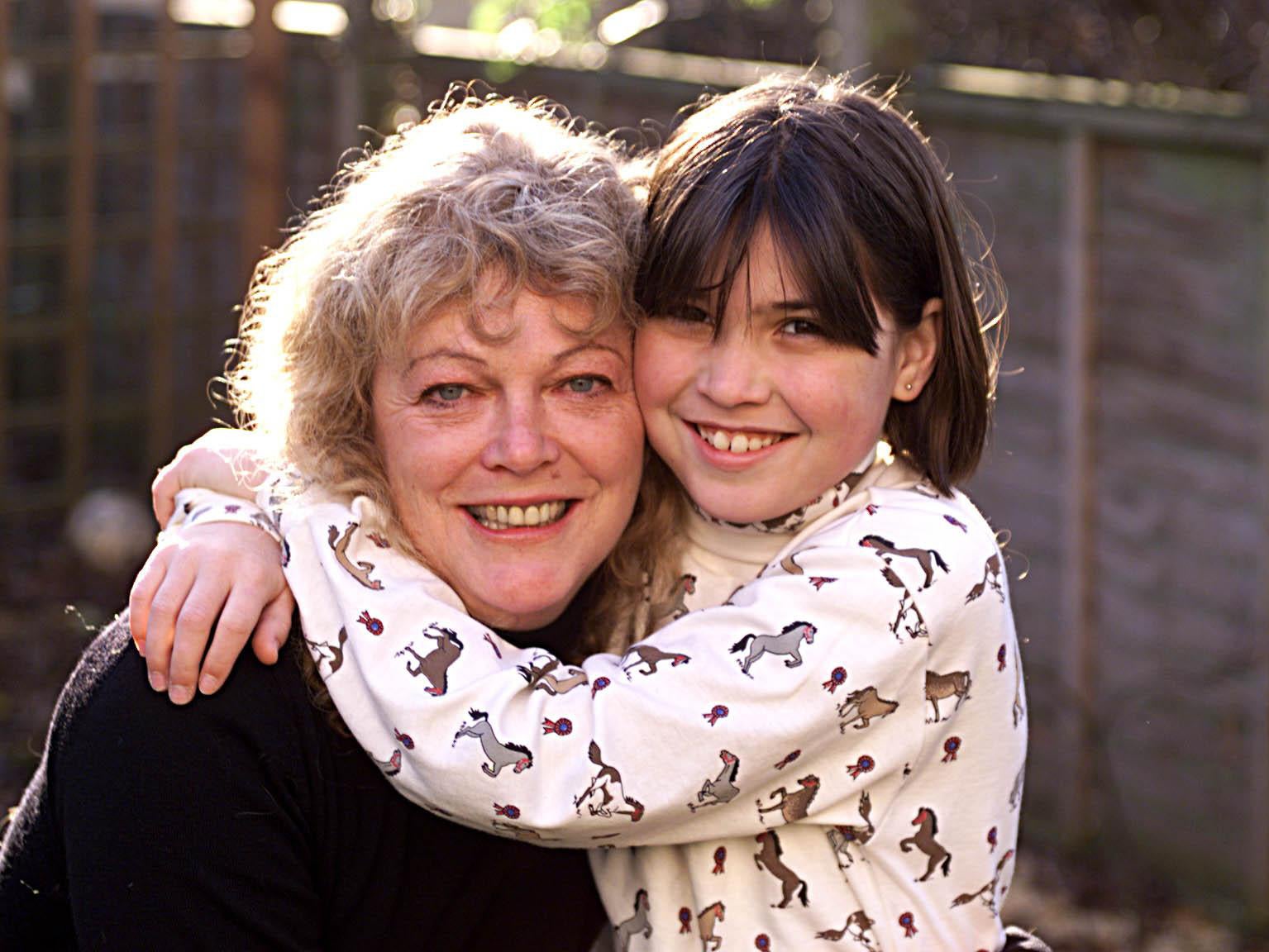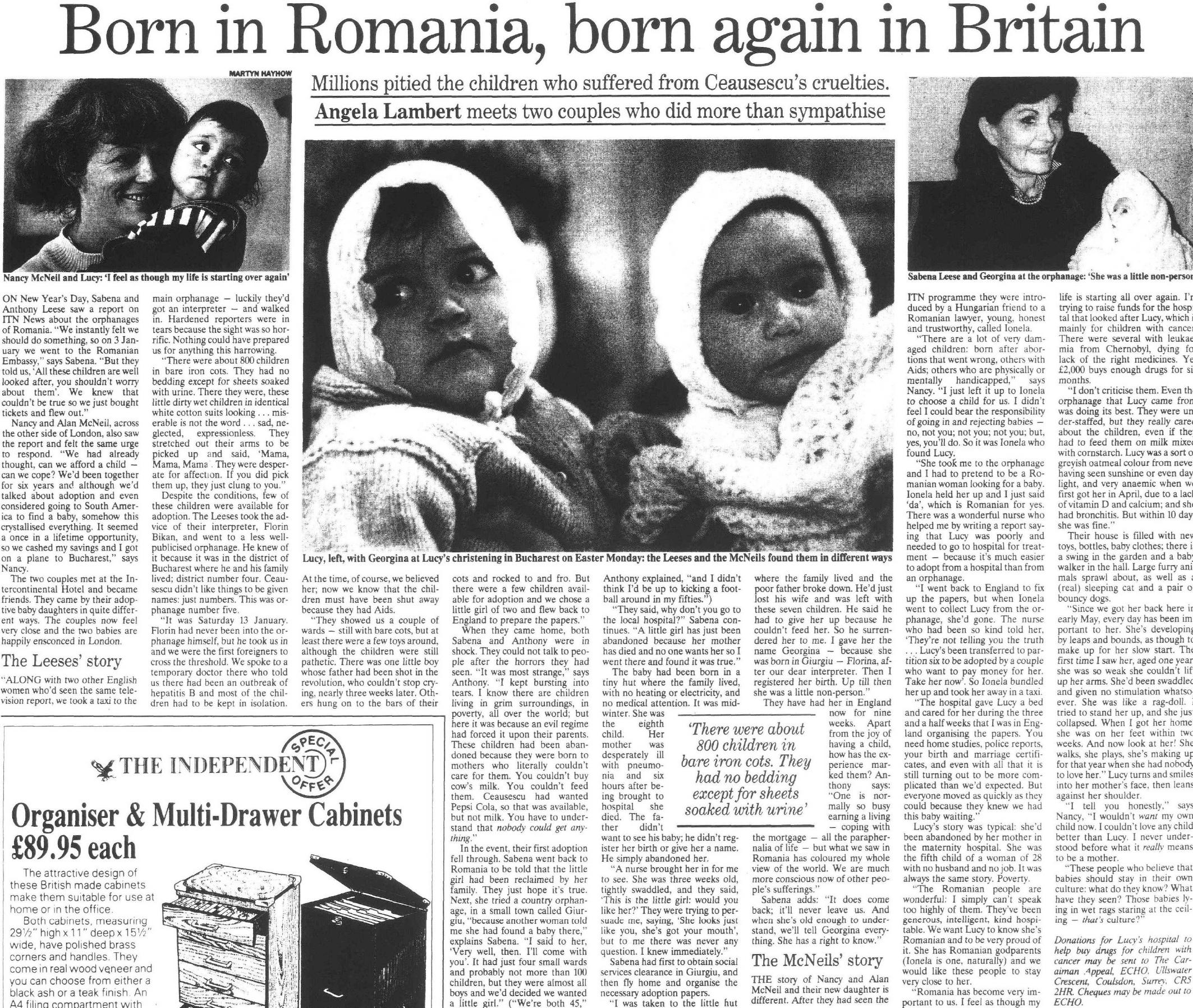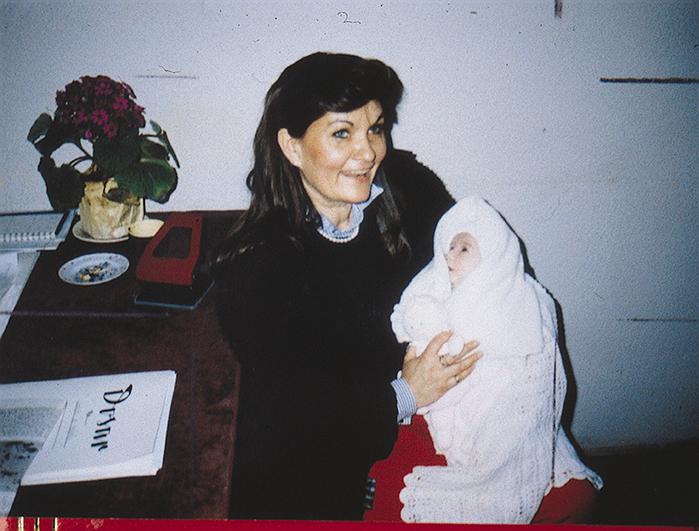The orphans born in Romania – and born again in Britain
After the cover-up was exposed, millions pitied the children who suffered from Ceausescu’s cruelties. In 1990, Angela Lambert met two couples who did more than sympathise

On New Year’s Day, Sabena and Anthony Leese saw a report on ITN News about the orphanages of Romania. “We instantly felt we should do something, so on 3 January we went to the Romanian embassy,” says Sabena. “But they told us, ‘All these children are well looked after, you shouldn’t worry about them’. We knew that couldn’t be true so we just bought tickets and flew out.” Nancy and Alan McNeil, across the other side of London, also saw the report and felt the same urge to respond. “We had already thought, can we afford a child – can we cope? We’d been together for six years and although we’d talked about adoption and even considered going to South America to find a baby, somehow this crystallised everything. It seemed a once in a lifetime opportunity, so we cashed my savings and I got on a plane to Bucharest,” says Nancy.
The two couples met at the Intercontinental Hotel and became friends. They came by their adoptive baby daughters in quite different ways. The couples now feel very close and the two babies are happily ensconced in London.
The Leeses’ story
“Along with two other English women who’d seen the same television report, we took a taxi to the main orphanage – luckily they’d got an interpreter – and walked in. Hardened reporters were in tears because the sight was so horrific. Nothing could have prepared us for anything this harrowing.
“There were about 800 children in bare iron cots. They had no bedding except for sheets soaked with urine. There they were, these little dirty wet children in identical white cotton suits looking… miserable is not the word… sad, neglected, expressionless. They stretched out their arms to be picked up and said, ‘Mama, Mama, Mama’. They were desperate for affection. If you did pick them up, they just clung to you.”
Despite the conditions, few of these children were available for adoption. The Leeses took the advice of their interpreter, Florin Bikan, and went to a less well-publicised orphanage. He knew of it because it was in the district of Bucharest where he and his family lived; district number four. Ceausescu didn’t like things to be given names: just numbers. This was orphanage number five.
“It was Saturday 13 January. Florin had never been into the orphanage himself, but he took us in and we were the first foreigners to cross the threshold. We spoke to a temporary doctor there who told us there had been an outbreak of hepatitis B and most of the children had to be kept in isolation. At the time, of course, we believed her; now we know that the children must have been shut away because they had Aids.
“They showed us a couple of wards – still with bare cots, but at least there were a few toys around, although the children were still pathetic. There was one little boy whose father had been shot in the revolution, who couldn’t stop crying, nearly three weeks later. Others hung on to the bars of their cots and rocked to and fro. But there were a few children available for adoption and we chose a little girl of two and flew back to England to prepare the papers.”
A decade on, abandoned and forgotten – read about our 2000 Christmas appeal
When they came home, both Sabena and Anthony were in shock. They could not talk to people after the horrors they had seen. “It was most strange,” says Anthony. “I kept bursting into tears. I know there are children living in grim surroundings, in poverty, all over the world; but here it was because an evil regime had forced it upon their parents. These children had been abandoned because they were born to mothers who literally couldn’t care for them. You couldn’t buy cow’s milk. You couldn’t feed them. Ceausescu had wanted Pepsi Cola, so that was available, but not milk. You have to understand that nobody could get anything.”
These children had been abandoned because they were born to mothers who literally couldn’t care for them. You couldn’t buy cow’s milk. You couldn’t feed them. Ceausescu had wanted Pepsi Cola, so that was available, but not milk. You have to understand that nobody could get anything
In the event, their first adoption fell through. Sabena went back to Romania to be told that the little girl had been reclaimed by her family. They just hope it’s true. Next, she tried a country orphanage, in a small town called Giurgiu, “because another woman told me she had found a baby there”, explains Sabena. “I said to her, ‘Very well, then. I’ll come with you’. It had just four small wards and probably not more than 100 children, but they were almost all boys and we’d decided we wanted a little girl.” (“We’re both 45,” Anthony explained, “and I didn’t think I’d be up to kicking a football around in my fifties.”)
“They said, why don’t you go to the local hospital?” Sabena continues. “A little girl has just been abandoned because her mother has died and no one wants her so I went there and found it was true.”
The baby had been born in a tiny hut where the family lived, with no heating or electricity, and no medical attention. It was mid-winter. She was the eighth child. Her mother was desperately ill with pneumonia and six hours after being brought to hospital she died. The father didn’t want to see his baby; he didn’t register her birth or give her a name. He simply abandoned her.
“A nurse brought her in for me to see. She was three weeks old, tightly swaddled, and they said, ‘This is the little girl: would you like her?’ They were trying to persuade me, saying, ‘She looks just like you, she’s got your mouth’, but to me there was never any question. I knew immediately.”

Sabena had first to obtain social services clearance in Giurgiu, and then fly home and organise the necessary adoption papers.
“I was taken to the little hut where the family lived and the poor father broke down. He’d just lost his wife and was left with these seven children. He said he had to give her up because he couldn’t feed her. So he surrendered her to me. I gave her the name Georgina – because she was born in Giurgiu – Florina, after our dear interpreter. Then I registered her birth. Up till then she was a little non-person.”
They have had her in England now for nine weeks. Apart from the joy of having a child, how has the experience marked them? Anthony says: “One is normally so busy earning a living – coping with the mortgage – all the paraphernalia of life – but what we saw in Romania has coloured my whole view of the world. We are much more conscious now of other people’s sufferings.”

Sabena adds: “It does come back; it’ll never leave us. And when she’s old enough to understand, we’ll tell Georgina everything. She has a right to know.”
The McNeils’ story
The story of Nancy and Alan McNeil and their new daughter is different. After they had seen the ITN programme they were introduced by a Hungarian friend to a Romanian lawyer, young, honest and trustworthy, called Ionela.
“There are a lot of very damaged children: born after abortions that went wrong, others with Aids; others who are physically or mentally handicapped,” says Nancy. “I just left it up to Ionela to choose a child for us. I didn’t feel I could bear the responsibility of going in and rejecting babies – no, not you; not you; not you; but, yes, you’ll do. So it was Ionela who found Lucy.
“She took me to the orphanage and I had to pretend to be a Romanian woman looking for a baby. Ionela held her up and I just said ‘da’, which is Romanian for yes. There was a wonderful nurse who helped me by writing a report saying that Lucy was poorly and needed to go to hospital for treatment – because it’s much easier to adopt from a hospital than from an orphanage.
One is normally so busy earning a living – coping with the mortgage – all the paraphernalia of life – but what we saw in Romania has coloured my whole view of the world. We are much more conscious now of other people’s sufferings
“I went back to England to fix up the papers, but when Ionela went to collect Lucy from the orphanage, she’d gone. The nurse who had been so kind told her, ‘They’re not telling you the truth… Lucy’s been transferred to partition six to be adopted by a couple who want to pay money for her. Take her now.’ So Ionela bundled her up and took her away in a taxi.
“The hospital gave Lucy a bed and cared for her during the three and a half weeks that I was in England organising the papers. You need home studies, police reports, your birth and marriage certificates, and even with all that it is still turning out to be more complicated than we’d expected. But everyone moved as quickly as they could because they knew we had this baby waiting.”
Lucy’s story was typical: she’d been abandoned by her mother in the maternity hospital. She was the fifth child of a woman of 28 with no husband and no job. It was always the same story. Poverty.
“The Romanian people are wonderful: I simply can’t speak too highly of them. They’ve been generous, intelligent, kind hospitable. We want Lucy to know she’s Romanian and to be very proud of it. She has Romanian godparents (Ionela is one, naturally) and we would like these people to stay very close to her.
“Romania has become very important to us. I feel as though my life is starting all over again. I’m trying to raise funds for the hospital that looked after Lucy, which is mainly for children with cancer. There were several with leukaemia from Chernobyl, dying for lack of the right medicines. Yet pounds 2,000 buys enough drugs for six months.
“I don’t criticise them. Even the orphanage that Lucy came from was doing its best. They were under-staffed, but they really cared about the children, even if they had to feed them on milk mixed with cornstarch. Lucy was a sort of greyish oatmeal colour from never having seen sunshine or even daylight, and very anaemic when we first got her in April, due to a lack of vitamin D and calcium; and she had bronchitis. But within 10 days she was fine.”
Their house is filled with new toys, bottles, baby clothes; there is a swing in the garden and a baby walker in the hall. Large furry animals sprawl about, as well as a (real) sleeping cat and a pair of bouncy dogs.
“Since we got her back here in early May, every day has been important to her. She’s developing by leaps and bounds, as though to make up for her slow start. The first time I saw her, aged one year, she was so weak she couldn’t lift up her arms. She’d been swaddled and given no stimulation whatsoever. She was like a rag-doll. I tried to stand her up, and she just collapsed. When I got her home, she was on her feet within two weeks. And now look at her! She walks, she plays, she’s making up for that year when she had nobody to love her.” Lucy turns and smiles into her mother’s face, then leans against her shoulder.
“I tell you honestly,” says Nancy, “I wouldn’t want my own child now. I couldn’t love any child better than Lucy. I never understood before what it really means to be a mother.
“These people who believe that babies should stay in their own culture: what do they know? What have they seen? Those babies lying in wet rags staring at the ceiling – that’s culture?”
This article first appeared on The Independent’s Living page on 4 July 1990
Join our commenting forum
Join thought-provoking conversations, follow other Independent readers and see their replies
Comments